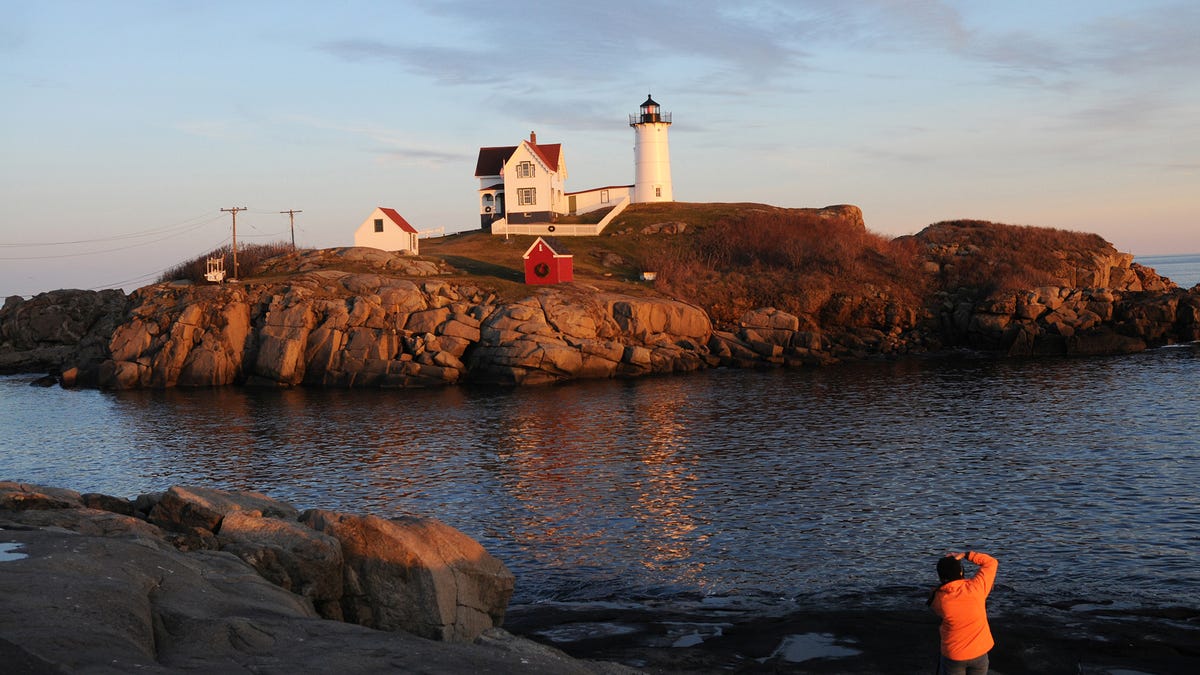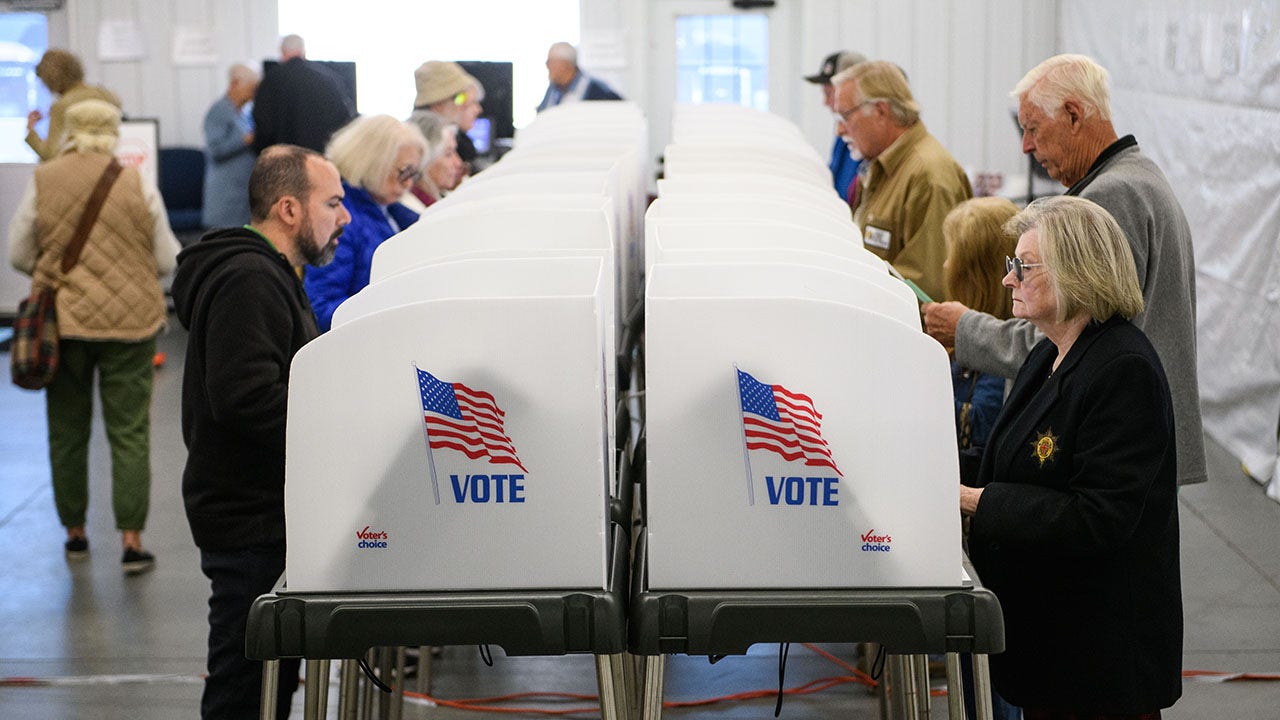Sign up for the Today newsletter
Get everything you need to know to start your day, delivered right to your inbox every morning.

Maine’s secretary of state is raising concerns over No Labels’s initiative to launch independent tickets across the United States, claiming that the organization misled voters into registering as third party for the 2024 election.
Secretary of State Shenna Bellows said on Monday that she received “complaints” from local clerks and voters who claim No Labels tricked them into joining the initiative to launch a third-party ballot in all 50 states.
THE FIGHTS THAT LAY AHEAD IN CONGRESS WITH DEBT CEILING IN REARVIEW
“Voter after voter is telling my team that they were instructed that they were merely signing a petition. They were not told they were changing their political party,” Bellows, who is a Democrat, said in an interview with NBC News on Monday.
“We have had enough similar complaints from voters and clerks alike that it raises serious concerns in our office about No Labels Party organizers.”
Bellows sent a cease-and-desist letter to Nicholas Connors, director of No Labels, as well as letters to every voter that registered with the party last month. She wrote to Connors that her office had “serious concerns” about the “conduct of your campaign” to enroll Maine voters in the No Labels Party for the 2024 election.
The centrist organization has been working to gain access to ballots across all states to open the doors for a third-party candidate in the presidential elections. No Labels is spending $70 million to launch an independent ticket in the United States. The group has gained momentum in Arizona, Colorado, Alaska, and Oregon.
In the letter to Connors, Bellows said voters told her office that they were approached to sign a “petition” to support the new party, and they did not understand that No Labels was asking Maine voters to “change their party enrollment.”
“We infer from these widespread reports that there are many more voters who are similarly unaware that they are now enrolled in the No Labels party,” Bellows said, adding that a voter registration card is not a petition and enrolling voters into a new party is “not petitioning activity.”
“The use of such terms is highly misleading, particularly since Maine law does provide for the use of petitions for many other types of political activity, such as the direct initiation of legislation and the nomination of candidates. Many Maine voters know what a petition is and understand that signing one does not change one’s party enrollment,” Bellows said.
Bellows also called attention to the fact that Maine voters may not know they are currently disaffiliated from their prior party and will be prevented from voting in the primary election of their choice if they remain in the No Labels party.
Maine is one of several states that allow only unaffiliated voters to participate in any party primary they choose but do not allow voters who are registered with one party to vote in another’s primary. So, voters who were unaffiliated and now are registered for the No Labels party will not be able to vote for a Democratic or Republican nominee.
Bellows sent an official letter to voters enrolled in the No Labels Party, alerting them to a possible change in their party affiliation.
“We are sending this letter to ensure that you are aware that you have enrolled in the No Labels Party. If you wish to remain enrolled in the No Labels Party you do not need to do anything,” Bellows wrote, urging people who believe they were “misled” into joining the party to contact her office.
Bellows warned in the letter that there is a three-month waiting period from the time a voter enrolled in the No Labels party before they can switch to a new party. After that, if someone wishes to enroll in a new party, there is a 15-day waiting period before that enrollment becomes effective, secretary of state communications director Emily Cook told the Washington Examiner.
Maine’s presidential preference primary is March 5, 2024, and the primary is June 11, 2024. If voters who switched to No Labels want to make changes to their affiliation, they would need to do so at least three weeks before the primary to secure the ballot of their choice. Maine residents who decide to vote absentee weeks ahead of Election Day would have plenty of time to change their party affiliation. However, Cook noted that many Maine voters like to vote on or close to Election Day, which is one of the reasons a letter was sent out to voters affiliated with the No Labels Party.
“The response we’ve seen from voters who received the letter has generally been of gratitude for the information provided,” Bellows said in a statement to the Washington Examiner. “Ensuring voters have the information they need to exercise their First Amendment right to associate with the party of their choice (or no party) and those parties’ associated primary elections in 2024, is our concern.”
For the 2024 election, No Labels is seeking to offer alternative candidates for voters who, polls show, do not want to see another showdown between President Joe Biden and former President Donald Trump. A poll released Tuesday from NewsNation and Decision Desk HQ showed that 23.38% of voters said they were very likely to consider a third-party candidate if Biden and Trump are the candidates.
A No Labels poll conducted in March found that 59% of respondents would consider voting for a centrist independent candidate over Biden and Trump. In a three-person race, the independent candidate received 20% of the support, compared with 33% for Trump and 28% for Biden. While 20% seems like an insignificant amount, Democrats worry that the No Labels initiative will aid a Republican victory.
New parties need to enroll 5,000 voters to qualify for the ballot in Maine, and Bellows said the state has had no issues with the other third parties active in the state.
No Labels organizers were told to ask voters to join the No Labels Party and the form that Maine voters signed was titled “Maine voter registration application,” said Matthew Sanderson, counsel to No Labels, in a letter to Bellows.
“No Labels is not aware of any circumstance where one of its organizers told a voter that they were merely signing a ‘petition.’ If you are indeed aware of any actual instance of an organizer misstating the purpose of No Labels’ effort, please provide that information and the organizer will be dismissed,” Sanderson said.
Sanderson said that No Labels had “no objection” to the secretary of state alerting “all 6,456 No Labels enrollees” to let them know of their affiliation. He added the group would be “interested” in knowing if the office finds someone joined unintentionally.
He said that No Labels “cautions” Bellows and her office from “creating and distributing its notification” and that the party asked the office to avoid language that would “encourage unenrollment.”
CLICK HERE TO READ MORE FROM THE WASHINGTON EXAMINER
“You are a member of a major political party and should not use your government office or public resources to suppress newly competitive political movements in this space,” Sanderson said. “No Labels requests that it receive an advance copy of the notification so that the organization can verify its impartiality.”
The Washington Examiner reached out to No Labels and Sanderson for comment.


AUGUSTA, Maine — Democrats on the Legislature’s budget committee voted Wednesday to raise the cigarette tax by $1.50 per pack, going further than Gov. Janet Mills’ original proposal and revealing a centerpiece of their upcoming spending bill.
The party-line change would mark the first time Maine has raised that tax in 20 years. It would rise from $2 to $3.50 per pack of cigarettes with a corresponding hike in taxes on other tobacco products. It is expected to generate $111 million over the next two budget years.
That money will be crucial to a planned addition to the $11.3 billion state budget that the Democratic-controlled Legislature passed over Republican opposition in March. After doing that, lawmakers had only $130 million in projected revenue available to spend with $120 million of that earmarked for a budget gap in the Medicaid program.
It sent Democrats scrambling for more money to neutralize cuts to certain programs that Mills made in her January budget proposal and to fund new bills piling up in the State House. They turned to the tobacco tax that Mills proposed raising by $1 per pack in that original plan.
Public health groups pushed for the change by noting that Maine’s tax is the second-lowest in New England despite the state having a higher-than-average cancer rate. Matt Wellington, the associate director of the Maine Public Health Association, called it “a long overdue step that will save lives” and reduce cancer in the state.
Yet critics have noted the tax falls hardest on low-income people. Some Democrats banded with Republicans to kill a flavored tobacco ban last year. Convenience stores have led an aggressive lobbying effort against a tax increase, and conservatives were incensed after the committee vote on Wednesday.
“This is a tax-and-spend budget,” Rep. Ken Fredette, R-Newport, an appropriations committee member, said Wednesday night.
Democrats have taken several party-line votes on the budget in the appropriations committee this week. On Wednesday, they voted against Mills’ proposed cuts to child care subsidies. They have also opposed controversial ambulance and pharmacy tax increases in the governor’s original budget offer.
The budget panel expects to vote on the final budget early Thursday, Sen. Peggy Rotundo, D-Lewiston, the committee’s co-chair, said. The full cost of the spending plan won’t be known until then.

Local News
The father and daughter who died hiking on Mount Katahdin in Maine earlier this month are being remembered by their loved ones for being “full of life” and “full of joy.”
The bodies of Tim Keiderling, 58, and his daughter, 28-year-old Ester Keiderling, both of Ulster Park, New York, were found near the summit of Mount Katahdin on June 3 and 4, respectively. Park rangers began searching for the father and daughter June 2 after finding their car still in the Baxter State Park day-use parking lot.
Tim Keiderling’s body was found following a massive search on Tuesday, with searchers locating Ester Keiderling’s remains a day later.
Heinrich Arnold, Tim Keiderling’s brother-in-law, said in a statement on Facebook that the father and daughter encountered “terrible” weather, which they succumbed to overnight.
“They were doing a day hike, a bucket list thing, to climb this amazing mountain,” he said. “Both wonderful people, full of life, full of joy.”
According to the obituary for the father and daughter, both were members of the Bruderhof religious group, an international Christian community focused on communal living.
In the obituary, loved ones wrote that Tim Keiderling was “an avid outdoorsman” who “loved bee-keeping, camping, and hiking” and worked in his community as an elementary school teacher, financial administrator, and traveling salesman.
“As a teacher, he will be remembered most for his infectious energy, his patient kindness, and his ability to pull together the most rambunctious groups of children,” the obituary reads. “He was at his best when teaching world history and geography, leading hikes through the fields and woods of the Hudson Valley, and spinning yarns around the campfire.”
Esther Keiderling and her father were close, according to their loved ones. She is being remembered for being “a sensitive, deeply-thinking woman who loved reading and writing, with a particular interest in the poetry of Gerard Manley Hopkins and Edna St. Vincent Millay.”
“Her friends remember with great fondness how attentive she was to the needs of those around her, noticing when someone needed a word of encouragement or a small gift of some kind,” the obituary reads. “Such gifts often included her own heartfelt poetry.”
According to their loved ones, what drew both father and daughter to hiking up to great heights was “always the view.”
“The broad expanse of God’s handiwork, laid out below them,” relatives wrote in the obituary. “The unbearable tragedy of their passing aside, it is perhaps fitting that they went Home from a mountain top: a place of danger and solitude, but also, a place close to God.”
Tim Keiderling is survived by his wife of 31 years, Annemarie, three other daughters, two sons, and two granddaughters, according to the obituary. Funeral services were held Sunday for the father and daughter in Rifton, New York.
Get everything you need to know to start your day, delivered right to your inbox every morning.

Every summer, Maine earns its nickname of “Vacationland,” drawing roughly 8 million visitors who come to explore its 3,500 miles of coastline (longer than California if you measure all the bays and inlets), feast on the nation’s best lobster (fresh off the boat or served on a buttery roll), to hike its mountains and endless pine forests, to shop, sightsee, breathe fresh air and to look up at the dark night sky and see, as if for the first time, the vastness of the universe.
It’s no wonder the Maine Office of Tourism boasts 97% of visitors would recommend Maine to their friends as a top vacation destination.
Maine is truly enormous, the size of all other New England states combined. One northern county, Aroostook, is larger than Connecticut and Rhode Island combined. So if you want to visit the entire state, you’ll need some time.
That said, many of Maine’s most treasured views, like those in York, Ogunquit and Kittery, are just over an hour’s drive from Boston.
This is part of a new USA TODAY network project showcasing breathtaking — and perhaps, underappreciated — views throughout the United States. These are some of the most beautiful landmarks, scenic vistas and hidden gems you can truly treasure in your area.
[ Most Treasured Views in America: National | West | South | Middle America | Northeast ]
Here are three of Maine’s Most Treasured Views: The Nubble Lighthouse, Marginal Way and the Portsmouth Naval Shipyard that are a perfect day trip from Boston. An energetic visitor could view all three sites and more in a day.
Whether you come for a day or longer this summer, we’re sure you’ll come away agreeing with the state’s motto: “Maine, the way life should be!”
The Nubble Lighthouse, in York, Maine, is one of the most photographed sites in the nation and each day artists set up their easels and paints to capture its scenic beauty.
Situated on rocky Nubble Island, just 600 feet from the shore, the lighthouse was first illuminated in 1879, according to a history by York Parks and Recreation, which owns and operates the landmark. It was manned by lighthouse keepers until 1987, when the light was fully automated.
The Nubble Lighthouse, officially called the Cape Neddick Light Station, is visually stunning. While visitors are not allowed on Nubble Island, Sohier Park offers close-up views of the red-roofed, whitewashed Victorian keeper’s house and the cast iron lighthouse tower.
While the lighthouse itself is just 41 feet high, it sits at the highest point on the small rocky island, giving it an elevation of 88 feet, allowing sailors to see its light from 13 nautical miles.
Meredith Reynells, a plein air painter, says when the weather’s nice she’ll set up her easel in Sohier Park two or three times a week. She said she’s drawn to the balance of the lighthouse and its support buildings, the rocky shore and the movement of the water.
“It’s not just ocean,” she said. “It has more going on.”
Sohier Park has 60 parking spots, restrooms and there are expanses of sea-smoothed flat stone, small grassy areas and benches for picnics. It also has a gift shop, where you can learn more about the lighthouse and all purchases go to support the upkeep of Nubble Light and Sohier Park.
Admission to Sohier Park is free, as are the limited parking spots. Dogs are allowed but must be on a leash.
After you are done visiting the lighthouse there is plenty more to do in York. Swim and splash in the waves at Long Sands Beach and enjoy the family-friendly amenities and Ellis Park Playground at Short Sands Beach. Restaurants featuring lobsters prepared how you like, fresh seafood and other summer favorites abound and don’t forget to stop in for salt water taffy you can watch being made at The Goldenrod. Stop in at York’s Wild Kingdom to see the new tiger and other zoo animals and amusement park rides.
Some of the best views of the Atlantic Ocean can be found along Marginal Way in Ogunquit, Maine. This 1.25-mile cliff walk runs from the bustling fishing village of Perkins Cove to the broad, sandy Ogunquit Beach.
Along the paved trail, which is wheelchair and stroller accessible, you’ll have unimpeded views of the coastline, crashing waves, spiraling seabirds, wizened red cedar trees, beach plums and honeysuckle. You’ll hear the clacking of stones rolling as waves break on the shore and the views stretch unimpeded to the horizon, broken only here and there by a bell buoy, a flock of seabirds or a passing boat or ship.
Ron Quinn, a plein air painter from Amesbury, Massachusetts, said he comes to Marginal Way several times a week.
“How can you beat this spot?” Quinn asks. “The rocky coast of Maine is one of the most beautiful spots I’ve ever found, and I’ve been pretty much all over the world painting.”
“What I love about this whole area is the active water,” Quinn said. “Trying to capture that on canvas. You’re trying to catch a moment in time.”
On the shore side of the trail, you’ll encounter the cottages, larger oceanfront homes and the grand oceanfront hotels with expanses of lawn and Adirondack chairs facing out to the sea.
Along the trail is the smell of salt water, flavored with seaweed, honeysuckle and wild roses.
If you finish your walk at Ogunquit Beach, you can continue along the broad white sands for miles, or just stop to take a swim. You can find casual dining and clam shacks at the beach and a short walk up Beach Street will bring you downtown. Drop in to The Front Porch, where you can sit at the oversized grand piano and join in the sing-along. Visit the many art galleries and antique shops. If you plan ahead, you can catch a Broadway-quality show at The Ogunquit Playhouse.
If you finish your walk in Perkins Cove, there’s more great shops and restaurants ranging from clam shacks to James Beard honored fine dining. President George H.W. Bush, whose family compound at Walker’s Point is located a few miles north in Kennebunkport, was a regular customer of Barnacle Billy’s. Be sure to check out the old Footbridge that you can raise and lower to let sailboats pass through the channel.
There is reasonably priced public parking and less reasonably priced private parking in both Perkins Cove and at Ogunquit Beach. You can also find street parking in downtown Ogunquit and access Marginal Way from the many side streets that feed into it.
The Navy’s submarine force is known as the silent service. These nuclear-powered behemoths are rarely seen as they patrol global waters.
To see a $3 billion nuclear submarine slicing through local waters inspires awe. The Moran tugboats guiding them in the fast-moving currents of the Piscataqua River are themselves photo-worthy.
Security is tight around the timing of submarine arrivals and departures, but it is possible on occasion for the public to see submarine maneuvers, sometimes with sailors visible manning the rail. The shipyard itself is a sight to behold.
Only two shipyards in the country overhaul US nuclear submarines, Puget Sound in Washington State and Portsmouth, Naval Shipyard in Kittery, Maine.
The Portsmouth Naval Shipyard, established in 1800 on Seavey Island, is the nation’s oldest continuously operated shipyard.
In the early 1970s, the shipyard transitioned from building submarines to providing overhaul, refueling and modernization work of the nation’s submarine fleet.Today the shipyard has the ability to overhaul three submarines at a time. It is undergoing a $2 billion modernization that will allow it to work simultaneously on five submarines.
Because the shipyard is an active military base, access is restricted, but visits can be arranged in advance by emailing: port_ptnh_ask_pao@navy.mil.
The imposing, castle-like building with the green roof on Seavey Island, is the long shuttered Naval Prison, built in 1898 to house Spanish-American War prisoners, it was closed in 1974.
“My favorite view of Portsmouth Naval Shipyard is our industrial waterfront,” said Capt. Michael Oberdorf, the shipyard commander. “Walking our deck plates among the talented workers, Sailors, and civilians, you can feel the pride and patriotism. There is a unique beauty in thousands of empowered individuals rolling up their sleeves in a unified effort to deliver excellence for our country.”
All the best views of the shipyard are themselves beautiful locations. Here are several:
Prescott Park, Portsmouth, NH: This beautiful public park is directly across the Piscataqua River from the shipyard and offers an unimpeded view. On most nights in the summer there is an outdoor concert or show that does not require advance reservations and is available for an $8 donation. Definitely take the time to stroll through the award-winning gardens.
Great Island Common, New Castle, NH: This 32-acre seaside park and beach also offers close-up views of the Whaleback Lighthouse at the entrance to Portsmouth Harbor
U.S. Coast Guard Station, New Castle, NH: Offers views of the shipyard, Whaleback Lighthouse and the recently restored Wood Island Life Saving Station.
Fort Foster, Kittery, Maine: During World War II heavy guns on Fort Foster stood sentinel over Portsmouth Harbor. From this spot you can see not only the shipyard but also Whaleback Lighthouse, Portsmouth Harbor Lighthouse and Fort Constitution. The fort is now a park with a beach. There is paid parking onsite.
One last recommendation: If seeing submarines from a distance doesn’t quench your curiosity, visit Albacore Park in Portsmouth, NH, just a stone’s throw from the shipyard on the Route 1 Bypass. Here you can go inside and touch and feel an actual submarine that was decommissioned in 1972.


Battle over Space Command HQ location heats up as lawmakers press new Air Force secretary


Interior Plans to Rescind Drilling Ban in Alaska’s National Petroleum Reserve


Video: Inside Trump’s Attack on Harvard


Microsoft will finally stop bugging Windows users about Edge — but only in Europe


California beach ‘Resist!’ protest pushes ‘kindness’ while calling to ‘86 47’ in anti-Trump message


South Korea’s presidential election aims to restore democratic credentials


Red state tops annual Heritage Foundation scorecard for strongest election integrity: 'Hard to cheat'


Two suspected Ugandan rebels killed in Kampala explosion